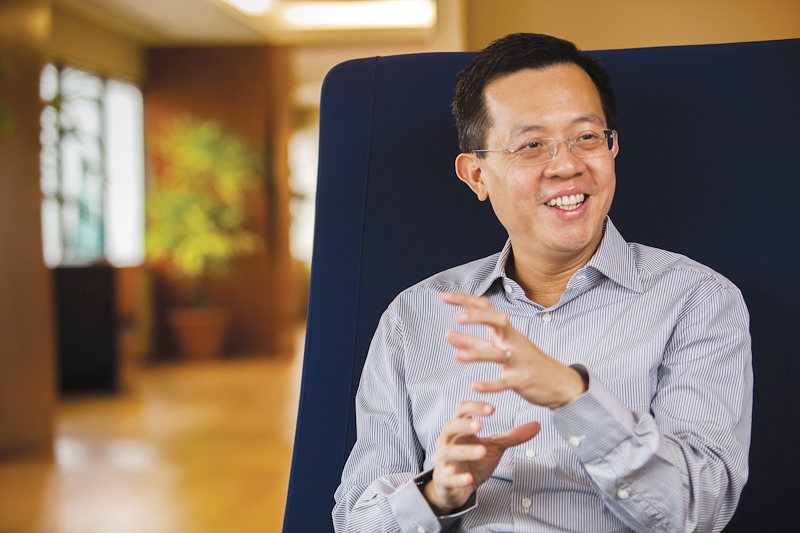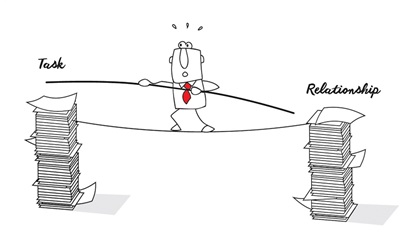"Leadership Makes or Breaks an Organisation"

It is not often that a leader in the Public Service gets to helm a startup. But that was exactly what Leo Yip, 48, had to do when he was tasked to kickstart the Workforce Development Agency in 2003.
Then fresh from the Ministry of Manpower, the current Chairman of the Economic Development Board says that was probably the most “acute” challenge he has encountered in his 30-year public service career.
“The organisation was set up with some people from the Manpower Ministry, some from SPRING, some from outside, and we had to build up a united team that had to deliver ‘from yesterday’,” he says on the urgency of setting up the WDA, in the wake of the post 911 economic downturn as well as the SARS crisis, to help the workforce through training and skills upgrading, and the unemployed find jobs.
It is one of many leadership challenges he has had to tackle, which have made him who he is today: The man tasked with enhancing Singapore’s position as a global business centre. And it is the theme of leadership which dominates Challenge’s interview with Mr Yip, whose belief is that “leadership makes or breaks an organisation”.
It can be said that his route to public service leadership was fairly typical: A Catholic Junior College student who took up a Singapore Police Force overseas scholarship, he was a police officer on the ground before working his way up the ranks, then in the Manpower Ministry and EDB.
Which begs the question: Can a scholar who has a privileged education and accelerated career path relate to, and empathise with, staff at the lowest rung of the organisational hierarchy and the man-on-the-street he is trying to serve?
Mr Yip asks, why not?
In his case, he credits his stint as an Investigation Officer at the now defunct Queenstown Police Station as an eye-opener to life. “I saw situations of distress and pain, I understood victims of crime, witnesses of crime and offenders, I developed a sense of empathy,” says Mr Yip, who chose a police scholarship to have a closer connection to the ground.
This people connection, he feels, is a necessary trait of a good leader, along with intellect and the ability to make decisions. “If all you do every day is think ‘task’ then it’s hard for you to think ‘people’,” he says. “It’s about communication to large groups and individuals, respecting people, making them feel that I value them as we talk.”
He also seeks to inspire. That, to him, is one of the key tasks for public service leaders today. “There must be a sense of aspiration or a sense of stretch in the organisation, to attain, create or build something which is better for the people of Singapore.”
The other two prongs in his trident of tasks for leaders is the need to ensure that people work with a “sense of connection to something bigger”, and the importance of creating a “sense of belonging in the workplace where people find meaning and fulfilment”.
One way that Mr Yip has tackled these tasks, in nearly every organisation he has led, is to go through a visioning exercise where the staff “collectively create a sense of the future”. Think workshops and discussions, where there is plenty of brainstorming on ideas of where the organisation should go.

Indulgent and time-wasting? No, says Mr Yip. “The process of talking through collectively, discussing and co-creating is a very powerful one, and it gets people to think about the future first of all.”
Just 15 months ago, he led the EDB in such an exercise which culminated in the organisation’s first internal vision statement: “A great organisation. A home. And a global leader in what it does.”
Some results from that exercise include initiatives to make EDB a stronger home for its officers, ideas on how the design of office space can nurture a stronger sense of community, as well as a redesign of work processes. “As we try to do new things, it’s also important that leadership is cognizant that there are things we should stop doing.”
Amidst his daily tasks of inspiring his people, meeting CEOs, selling Singapore to investors and delivering on his promises and travelling about 10 times a year, the father of two teenagers manages to carve out time for himself by slipping on a pair of jogging shoes.
He finds his thinking moments in long solo jogs of up to 20 km. When he is in Singapore, he hits the road straight after work at 8pm about twice a week, around the Changi area, and returns home two hours later for dinner.
He says: “It keeps my mind clear. We all need solitude for self-reflection, and in doing so, we become more anchored, and more humble.”
Our trusted PUB product.
Your favourite flavour or brand?PUB water, with nothing added.
Where do you usually have your cuppa?I carry a flask of water with me in the office.
- POSTED ON
May 25, 2012
- TEXT BY
Wong Sher Maine
- PHOTOS BY
Norman Ng
-
Work Better
Reframing Tension as an Opportunity to Engage
-
Work Better
Dealing with Inter-Generational Conflict









